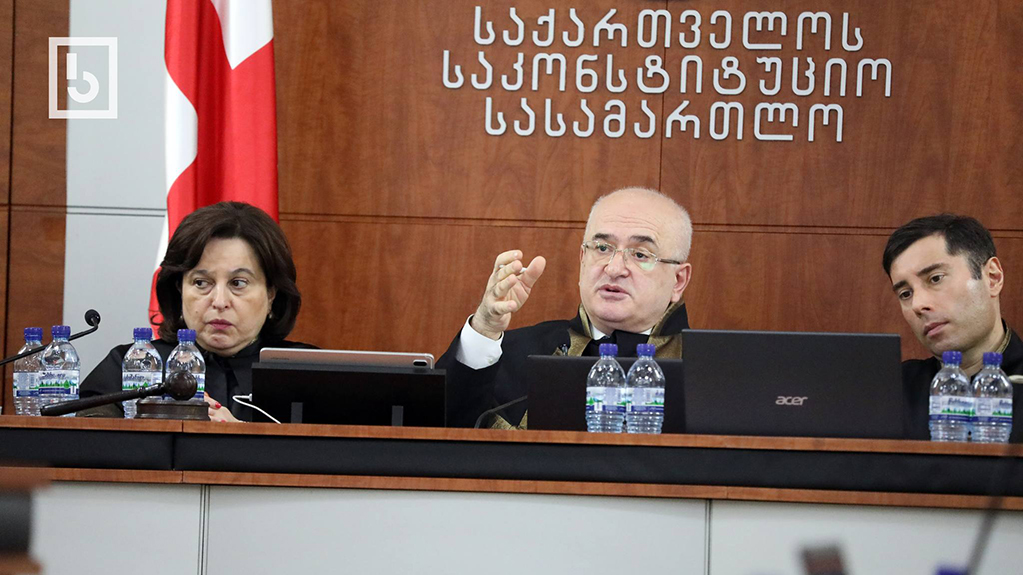On October 9, the Constitutional Court of Georgia published its decision not to suspend the implementation of the so-called Foreign Agents Law, modeled after Russian legislation. It took the court nearly a month and a half to reach this decision.
News
Judges Merab Turava, Manana Kobakhidze, Eva Gotsiridze, Giorgi Tevdorashvili, Vasil Roinishvili and Khvicha Kikalishvili did not support the suspension of the Russian law. According to the protocol, Giorgi Kverenchkhiladze and Teimuraz Tughushi had a different opinion about the rejection of the motion to suspend the disputed norms.
“The plaintiffs' petition to suspend the validity of the disputed provisions until the final decision on the case should not be granted.
The claimant failed to convince the court that, prior to the final decision, public trust in these organizations would be undermined, or their business reputation damaged to the extent that it would likely result in their complete paralysis, or that restoring trust in them would become impossible.
At this stage, no monitoring of any organization has even begun. Therefore, from this perspective, there are no immediate risks of irreparable violations of any organization's rights.
Additionally, it should be noted that the by-law adopted to enforce the disputed provisions currently regulates the rules for submitting/publicizing information. Organizations are no longer required to include personal data, such as the personal identification number of recipients, their identification codes, or bank account numbers in the expenditure section - an issue the plaintiffs raised in their request to suspend the disputed provisions.
The court also considered the clarification provided by the representative of the executive body responsible for implementing the disputed norms - the National Agency of Public Registry - regarding the practical application of the law. Specifically, in response to a question about the disclosure of journalistic information sources, the representative made it clear that the subjects/organizations governed by the disputed norm are not required to disclose or identify the source of journalistic information in their financial declarations. "Organizations can redact specific data and submit documents in a way that prevents the identification of the information source," the court minutes stated.
With respect to concerns about European integration, the Constitutional Court explained that "no justification has been provided as to how suspending the law pending a substantive review would prevent a deterioration in relations with the European Union."
Another judge, Eva Gotsiridze, expressed a different opinion concerning Article 78 of the Constitution of Georgia.
"The dissenting opinion of Judge Eva Gotsiridze shall be attached to the records of constitutional lawsuits No. 1828 and No. 1834, concerning the Transparency of Foreign Influence, in relation to Article 78 of the Constitution of Georgia, specifically in the part requesting recognition of its unconstitutionality," the decision states. The dissenting opinions of the judges are not available at this time.
The Constitutional Court has accepted all four constitutional lawsuits against the Russian-style law for partial consideration. The plenum of the Constitutional Court, consisting of eight judges, will hear the case. As the court's chairman, Merab Turava, stated during the sessions held on August 29-31, the ninth judge, Irine Imerlishvili, cannot participate in the case due to health issues.
According to Saba Brachveli, a lawyer from the Civil Society Foundation, the decision published today allows for several conclusions:
- The Constitutional Court (specifically, the six judges who signed the decision) is complicit with the 85 deputies who passed the Russian Law;
- The court delayed the publication of its decision to allow the public registry to temporarily ease the requirements for organizations that have registered. Afterward, instead of basing its decision on the text of the law, it relied on the one-month practice of the registry and gave it the green light for future monitoring;
- At best, the Constitutional Court is acting foolishly, and at worst, it is a conscious criminal and traitor to its own people and Constitution;
- We will continue our activities until the elections. This decision will not hinder our work. It doesn’t matter if six judges refuse to recognize the Russian law as unconstitutional - the Georgian people will do so in 17 days.
The plaintiffs against the Russian Law in the Constitutional Court include the President of Georgia, 38 members of Parliament, 122 non-governmental and media organizations, Georgian News and Studio Monitori. All four plaintiffs requested the suspension of the law until the final decision is made.
The Russian Law requires Georgian public organizations and media outlets that receive more than 20% of their funding from international donors to register as carriers of the interests of a foreign power, referred to by the authorities as agents of a foreign country. The law mandates these organizations to submit financial declarations and other documentation, which includes special categories of personal data. It also grants the Ministry of Justice's National Public Registry Agency the authority to request various information, including confidential data, from these organizations. Failure to comply with the law results in fines of approximately 55 000 GEL for organizations and 5000 GEL for individuals (including former or current employees, service providers, volunteers, etc.). The law is retroactive and applies to the year 2023.
The adoption of this Russian Law has halted Georgia's integration process with the European Union. On these grounds, the plaintiffs have requested the suspension of the law's implementation until a final decision on the case is reached.















